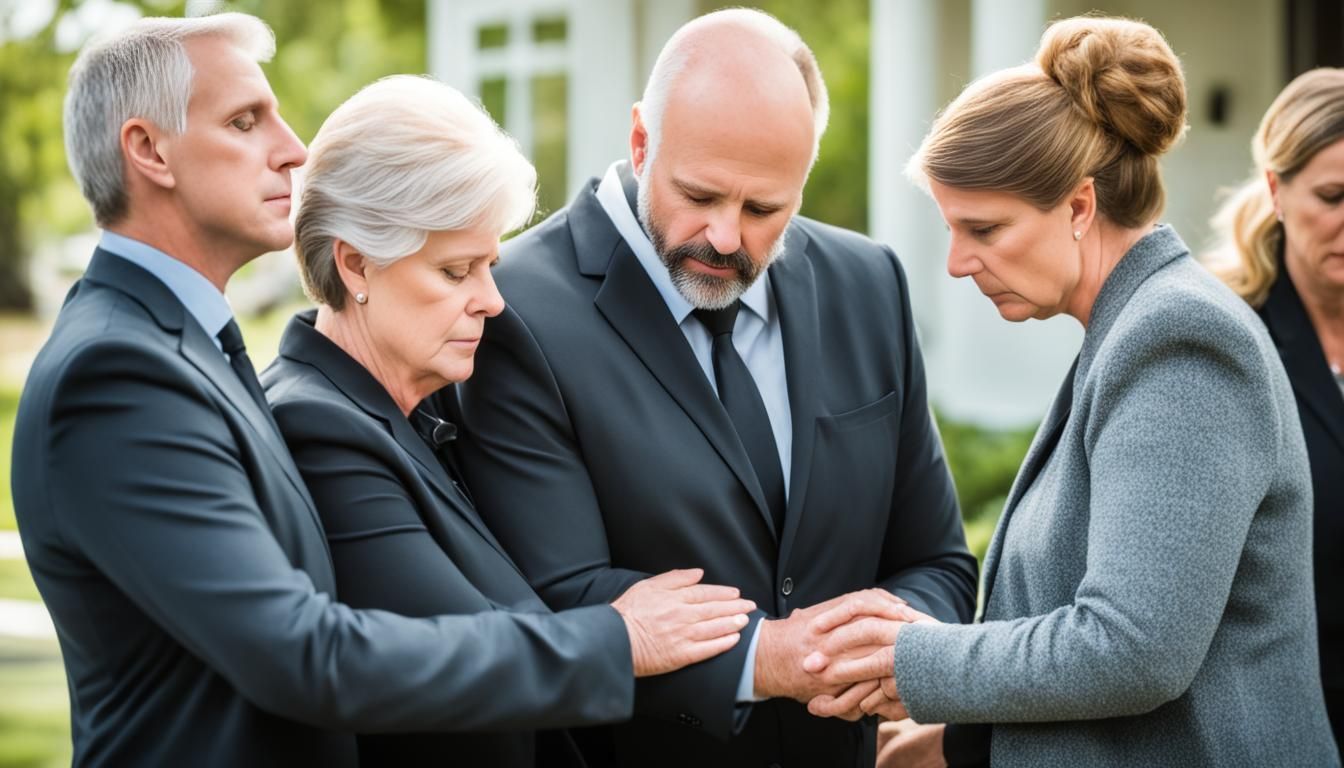Honoring Care: Recognizing National Hospice Month
Honoring Care: Recognizing National Hospice Month
Imagine a movement that changes the lives of nearly 1.6 million patients every year in the U.S. This number shows not just how common terminal illnesses are, but how crucial hospice care is. It brings peace in hard times. November is when we spotlight the kind work of hospice caregivers. It's a time to thank them for their huge support to those with terminal illnesses and their families.
At the center of this tribute is huge respect for the dignified end-of-life journey. It promotes Courageous Conversations about making a person's final days reflect their values and wishes. Highlighting national hospice month leads us to look at the vast network of care. Skilled professionals and volunteers create this network. Edwards Funeral Service joins in this tribute by posting obituaries, creating touching memorial tributes, and offering resources to help with grief.
Key Takeaways
- November's National Hospice Month brings awareness to the exceptional care provided to patients with life-limiting conditions.
- Support for terminally ill patients is crucial in upholding their dignity and comfort during their most vulnerable moments.
- End-of-life care resources play a fundamental role in not only patient comfort but also in supporting their families through difficult times.
- The initiative encourages open discussions around mortality to ensure care aligns with personal values and end-of-life preferences.
- Organizations like Edwards Funeral Service contribute to the community by spearheading efforts to recognize these vital conversations and support those in mourning.
Understanding Hospice Care and Its Vital Role
Hospice care helps terminally ill patients live their last days to the fullest. It's more than medical help. It cares for the physical, emotional, and spiritual needs of patients. With a team of healthcare professionals, every aspect is covered. This includes symptom management and emotional support for patients and families.
Defining Hospice and Palliative Care
Hospice and palliative care improve life quality for those with serious illnesses. Though they seem similar, they have differences. Palliative care starts at diagnosis and continues throughout the treatment. Hospice care, however, is for the final stages of life. Both focus on comfort and dignity, respecting the patient's wishes.
When Is Hospice Care Appropriate?
Choosing hospice care is a major decision. It's considered when life expectancy is six months or less, given the illness's course. It also comes into play when treatments no longer work. This choice focuses on comfort and support, rather than curing the disease.
The Interdisciplinary Hospice Care Team
Hospice care's success comes from its team approach. The team includes doctors, nurses, social workers, chaplains, and volunteers. Each member offers unique skills. They ensure care that meets all needs of the patient and family.
Here's a quick look at the hospice care team roles:
| Team Member | Role | Contribution |
|---|---|---|
| Doctor | Medical Care | Manages pain and symptoms; oversees medical regimen |
| Nurse | Day-to-day Care | Monitors patient condition; administers medications and treatments |
| Social Worker | Emotional Support | Provides counseling; assists with practical and financial planning |
| Chaplain | Spiritual Care | Offers spiritual support tailored to patient's beliefs |
| Volunteer | Companionship and Support | Engages with patients; offers respite for family members |
This care approach tackles both physical pain and emotional stress. By bringing together specialists, hospice care gives thorough care. It respects the dignity and wishes of everyone involved.
Recognizing National Hospice Month: Courageous Conversations
This November, we remember National Hospice Month. The theme "Courageous Conversations" makes us think about talking openly about end-of-life care. It encourages us to change how society views dying. It also ensures care reflects what we value and want.
The 2023 Theme: Why It Matters
The theme for National Hospice Month 2023 shines a light on honest talks about end-of-life wishes. It aims to shift focus from only medical interventions. This is to help people face their final days in a way that matches their beliefs and brings comfort.
Encouraging Meaningful Dialogue on End-of-Life Care
Having "Courageous Conversations" about how we want to spend our last days can help lessen the emotional strain. It's about encouraging talk that respects what the person wants. This ensures they receive care that aligns with their wishes.
How Edwards Funeral Service Supports These Dialogues
Edwards Funeral Service is key in promoting these important discussions in the community. They offer resources and guidance for talking about end-of-life care wishes. This helps people and their families make choices that mirror their personal values and needs.
Participating in National Hospice Month: How You Can Make a Difference
Every November gives folks a chance to impact lives of terminally ill patients and their families. This is done through various activities during National Hospice Month. By volunteering, supporting the grief process, and spreading awareness, you play a key role. Even though Edwards Funeral Service isn't a hospice care provider, it deeply supports this cause.
Vital Support for Terminally Ill Patients and Their Families
National Hospice Month focuses on teaching the public about hospice's key role. It aids in patient comfort and supports families. Edwards Funeral Service helps by providing resources for families in loss, stressing community support in the grief process.
Volunteer Opportunities with Edwards Funeral Service
Volunteering during National Hospice Month is fulfilling, with various roles available. These include caring for patients, giving emotional support, and helping in special events. Such actions honor the lives of patients.
Edwards Funeral Service: Resources and Support for Grieving Families
Supporting the grieving is central to Edwards Funeral Service's effort. Their help goes beyond just after the loss; they provide workshops, counseling, and help with memorial services. This ensures families get custom care and attention.
| Service Offered | Description | Impact on Families |
|---|---|---|
| Memorial Services | Organization and execution of personalized remembrance events. | Provides a dedicated time and space for mourning and celebrating the life of loved ones. |
| Counseling Referrals | Connections to experienced counselors specializing in grief. | Supports emotional well-being of family members during the grieving process. |
| Educational Workshops | Workshops on dealing with loss and understanding the grief journey. | Empowers families with knowledge to handle their grief constructively. |
Conclusion
National Hospice and Palliative Care Month is a key time for promoting awareness of hospice care. It emphasizes empathy and respect in end-of-life care. The dedication of caregivers shows deep compassion and dignity. Their hard work is vital for supporting hospice care's core values.
Every moment is precious, especially during tough times at the end of life. Caregivers' strong commitment shows that each moment should be valued. This belief is central to hospice care.
Edwards Funeral Service plays an important role in recognizing national hospice month. They honor those who have died with respectful memorial tributes. Their work reflects the dedication seen in hospice care. It also offers comfort to those grieving.
Hospice and palliative care give important choices for improving life quality at its end. Recognizing national hospice month reminds us of the support for the terminally ill and their families. As this month ends, we continue to promote awareness, respect, and remembrance. These values are the heart of hospice care.
FAQ
What is National Hospice Month and why is it important?
In November, we celebrate National Hospice Month. It highlights the critical support hospice and palliative care offers to terminally ill patients and their families. The goal is to spread awareness, educate, and honor the commitment of hospice workers and volunteers. This helps build a culture that values the end-of-life journey.
What are hospice care and palliative care, and how do they differ?
Hospice care focuses on comfort for patients with a life expectancy of six months or less, when treatments no longer aim to cure. Palliative care is available at any serious illness stage. It helps manage symptoms and pain. It also provides emotional and spiritual support, no matter the prognosis.
When is hospice care deemed appropriate for a patient?
Hospice care suits terminally ill patients when their treatment shifts from cure to comfort. This is typical when their life expectancy is six months or less, based on their illness's usual progression.
Who is part of the interdisciplinary hospice care team?
The hospice care team consists of professionals like doctors, nurses, and social workers. Chaplains and trained volunteers also help. They work together to align care with the patient's wishes and support the family.
Why are Courageous Conversations the theme for National Hospice Month 2023?
The "Courageous Conversations" theme urges us to talk openly about end-of-life choices. These discussions help respect patients' values and desires. They ensure end-of-life care matches those wishes.
How can I help support hospice patients and their families during National Hospice Month?
You can support by volunteering at local hospice groups, sharing hospice care stories, and joining end-of-life care events. This helps raise awareness and supports patients and families.
What opportunities are available for those who want to volunteer with hospice care services?
Volunteers can offer companionship, help with office tasks, or support fundraising. They also provide bereavement support and use their talents, like music or art, to improve patient quality of life.
How does Edwards Funeral Service contribute to supporting families through the grieving process?
Edwards Funeral Service offers grief resources, posts obituaries, and organizes tributes. They help families honor their loved ones with care and compassion.










